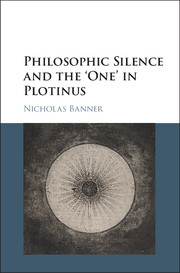Book contents
- Frontmatter
- Contents
- Preface
- List of Abbreviations
- Introduction
- PART I The Cultural Roots of Platonist Philosophic Silence
- PART II The Transcendent Absolute, the Ineffable and Plotinian Poetics of Transcendence
- 5 The Development of the Transcendent Absolute in the Middle Platonist Milieu
- 6 The Transcendent Absolute and the Ineffability of Reality in Plotinus
- 7 The Poetics of Transcendence in Plotinus
- Conclusion
- Appendices
- Select Primary Bibliography
- Secondary Bibliography
- Index
6 - The Transcendent Absolute and the Ineffability of Reality in Plotinus
from PART II - The Transcendent Absolute, the Ineffable and Plotinian Poetics of Transcendence
Published online by Cambridge University Press: 16 March 2018
- Frontmatter
- Contents
- Preface
- List of Abbreviations
- Introduction
- PART I The Cultural Roots of Platonist Philosophic Silence
- PART II The Transcendent Absolute, the Ineffable and Plotinian Poetics of Transcendence
- 5 The Development of the Transcendent Absolute in the Middle Platonist Milieu
- 6 The Transcendent Absolute and the Ineffability of Reality in Plotinus
- 7 The Poetics of Transcendence in Plotinus
- Conclusion
- Appendices
- Select Primary Bibliography
- Secondary Bibliography
- Index
Summary
Determinatio negatio est.
Baruch Spinoza, Ep. 52.Plotinus’ world-view is, in a sense, very simple; at the same time, it is very difficult to understand and explain. Plotinus is intensely aware of this difficulty, and his work is a series of attempts at clarifying the ramifications of this world-view. The Enneads reflect to some extent the day-to-day disputations of Plotinus’ philosophic seminar, and the reader can often detect the puzzled questions of his students informing the varied approaches Plotinus musters to clarify difficult points, and in his patient, indefatigable attempts to explain these matters one sees the Socratic midwife gently encouraging the truth, bit by bit, into the light of day.
Scholarship, particularly over the course of the last fifty years, has gone a long way toward explaining how Plotinus thinks the world is, and why it is that way. There is a problem prior to the questions of metaphysics, however, which the disciplines of analytic philosophy and the history of ideas have largely failed to address. This is the problem of ineffability and its implications for written philosophy.
Plotinus simply does not believe that reality is fully susceptible to an explanatory account. He has cogent and well thought-out reasons for this belief; the history of philosophy has long since disposed of the anachronistic figure of Plotinus the anti-rationalist, who took refuge in the vague territory of ‘mysticism’, and has brought forth in its stead the more accurate model of a philosopher whose reason led him to place certain aspects of reality outside the scope of thought and language. Analytical philosophy has done an excellent job of delineating the levels of reality in Plotinus’ metaphysics, and a decent job of showing at what points Plotinus believes discourse and thought fall short of reality; we have, as it were, a good map of Plotinus’ world-view, with the borders roughly marked out. The present chapter explores these borders, noting the limits Plotinus places on discourse and on different types of cognition. While recognising these limits, we should also be alive to the power of rhetoric in philosophy; the following chapter will thus proceed to tear down this elegant systematic structure, when we address Plotinus’ writing of the unwritable, in which he repeatedly assails, and passes beyond, these self-erected borders.
- Type
- Chapter
- Information
- Philosophic Silence and the ‘One' in Plotinus , pp. 176 - 210Publisher: Cambridge University PressPrint publication year: 2018



